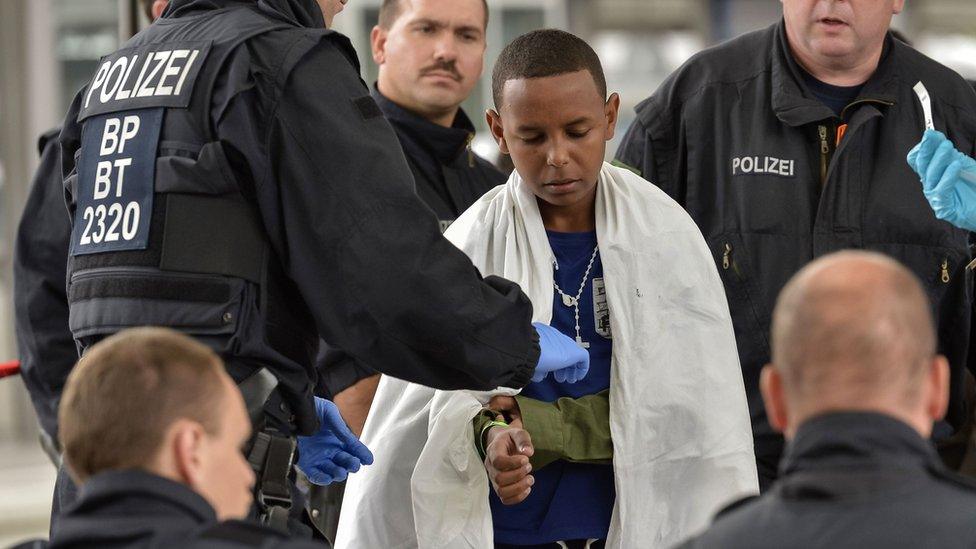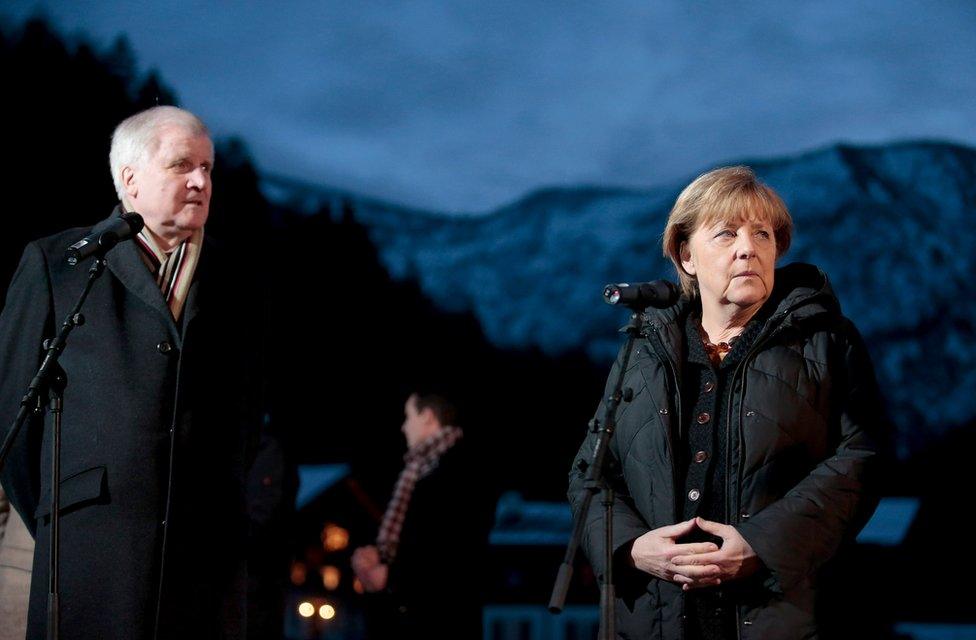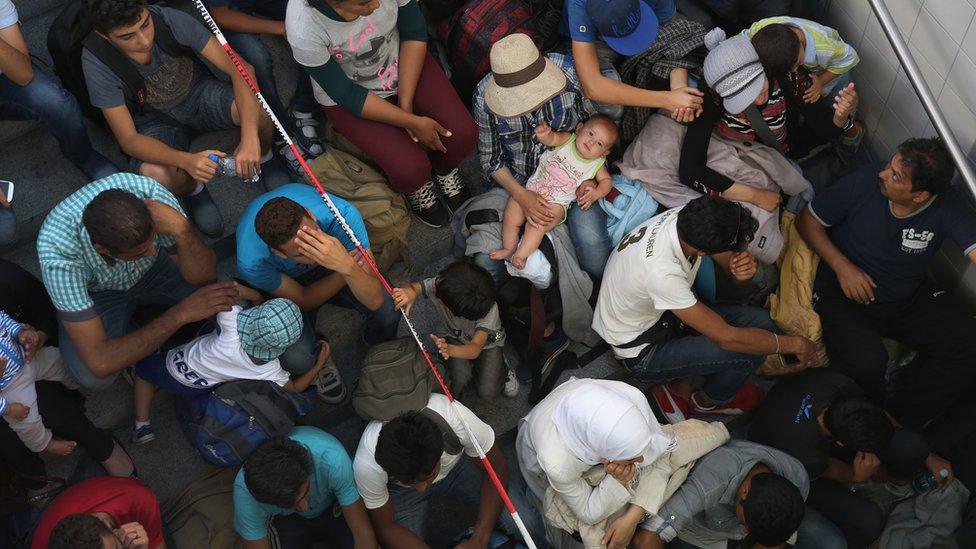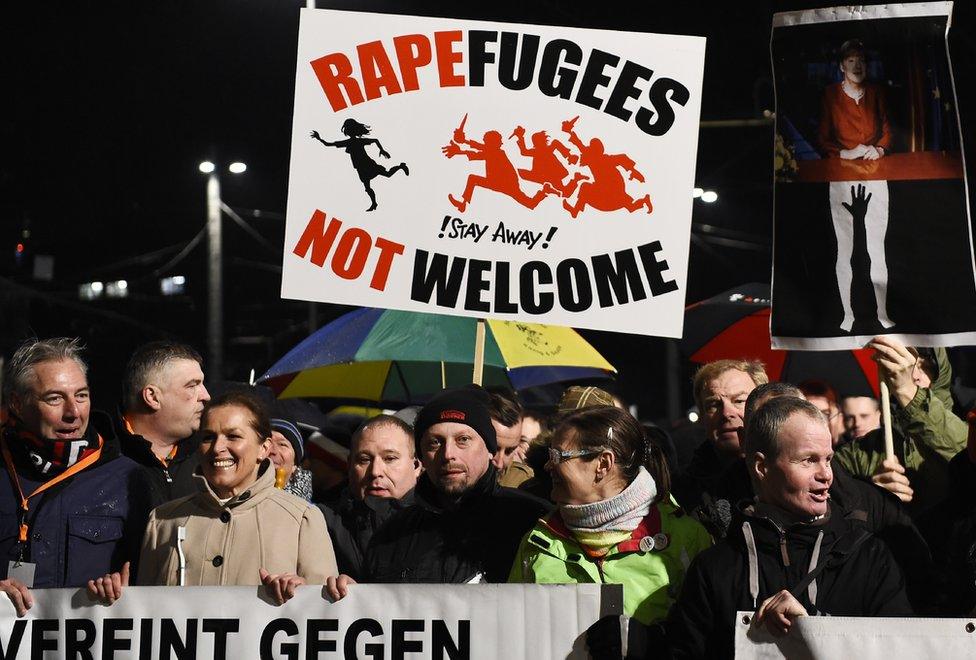Migrant crisis: Will Merkel be left out in the cold?
- Published

Hundreds of migrants are arriving every day at Rosenheim train station in Bavaria
On the platform of Rosenheim station, the German police have got the reception of asylum seekers down to a fine art.
Twice hourly, the Austrian authorities put them on trains across the border, and the Germans are there to receive and process them.
Behind this practised routine though there looms a crisis for Germany and Europe. For the numbers arriving in Rosenheim and other centres in Bavaria are still so large that it has triggered a revolt against Chancellor Angela Merkel and her policy of allowing unlimited numbers of asylum seekers to come to her country from war zones.
As we watched people registering at Rosenheim, Inspector Benjamin Fretscher told me that arrivals there are running at between 800 and 2,000 a day. But when you include those getting to other centres in the southern German state, the total comes to 3,000-4,000 each day, officials told us off camera - a very different story to the 2,000 daily mentioned recently by Germany's interior minister.
That 3,000-4,000 figure could be politically ruinous for Mrs Merkel, for - at that rate - far from the steep cut promised for 2016 by the German government, this year's asylum seekers would far exceed last year's 1.1 million.
What's more, Germany finds itself in this situation at a time of year when Mediterranean storms and freezing Balkan weather are thought to be holding migration down - spring promises still higher numbers.
Faced with this crisis, the chancellor has found herself deserted by many erstwhile allies. The CSU, the Bavarian branch of her CDU ruling party, had been muttering discontentedly for months about the numbers of new arrivals but this has now moved into open revolt.
Last week both Mrs Merkel and her popular finance minister Wolfgang Schauble went down to a CSU conference being held in the tiny spa town of Wildbad Kreuth in an attempt to persuade them to give more time to a multilateral effort to reduce the flow of migrants across Europe. But we found delegates unconvinced.

Will Angela Merkel be left out in the cold over the migrant crisis?
"We have to reject immigrants," said Markus Blume, a CSU member in the Bavarian state parliament. As to when Germany would have to impose its own border controls Mr Blume said, "it's a question of days or weeks but not of months".
When I asked another delegate, Hans Reichart, head of the CSU youth wing, whether this wouldn't mean the end of Europe's border agreement he replied: "Yes, it is the end of Schengen, yes."
The immigration question now threatens not just the future of Schengen, and perhaps even of the Euro, but Mrs Merkel's political survival as well. Faced with regional elections in three states in March, many CDU members are becoming alarmed about the growth of the right-wing opposition party Alternative fuer Deutschland (AfD) and the faltering of their own poll numbers.
In Bavaria, Peter Dreier, a district mayor belonging to another right-wing party has raised the prospect of local disobedience to the resettling of refugees. Earlier this month, he packed off a busload of them to Berlin, saying he couldn't settle any more in his district, Landshut. With thousands already placed in rental accommodation in villages dotted around the district, Mr Dreier says he is having to dump hundreds more in poor temporary shelters and fears "social harmony is at risk".



He directed us to a disused supermarket in Velden where he has had to house 180 refugees for the past three months. Speaking to people there, some told us they didn't feel safe because of sectarian rivalries breaking out in the cramped accommodation.
Cooped up for most of the day, some of the men went out drinking, a situation which one refugee from Syria told us he feared could produce, "a catastrophe" with the local community.
The alleged sex crimes at New Years Eve festivities in Cologne have angered many Germans, and contributed to far-right attacks on asylum seekers. In many communities, new arrivals are simply being sent to school halls, industrial units, or former shops like the one in Velden while the authorities try to find more permanent accommodation. A system that functioned through last autumn has begun to seize up.

The Cologne attacks have fuelled anti-migrant feelings among some Germans
On Monday, European interior ministers meeting in Amsterdam agreed a raft of possible measures for suspending the Schengen agreement, and containing new arrivals in Greece.
Many in the CSU are now going beyond this though, urging a strong German national response as well as measures to strengthen the external borders of the EU.
At Wildbad Kreuth, Plan B options under discussion by CSU leaders included capping asylum places in Germany this year at 200,000, closing Germany's borders, and taking legal action against Mrs Merkel's government to force a vote on its immigration policy in the federal parliament.
Where this leaves Mrs Merkel is a moot point. One local official in Landshut told me, "she will be gone by summer". But many who have bet on her political demise before - for example during the Euro crisis - have been wrong-footed by her political skill and survival instinct.
Nevertheless there is a growing worry, even within her own party, that their leader has committed herself so fully to a policy of unrestricted asylum that it could finish her. "She has not left herself a way out," one CDU politician told me. "And this is starting to worry me."
Mark Urban is diplomatic and defence editor for BBC Newsnight. You can read more on his blog and follow him on Twitter, external